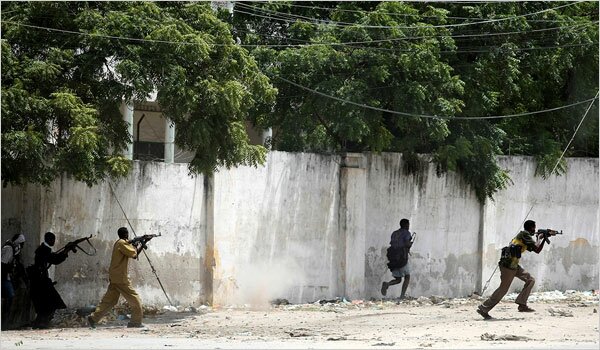Another Day in Somalia, Fresh Fighting and Unlikely Victims
 NAIROBI, Kenya — Masked gunmen forced a group of eight Muslim preachers, most of them from Pakistan, out of a mosque in the Somali town of Gaalkacyo at dawn prayers on Wednesday and shot them, residents and witnesses said.
NAIROBI, Kenya — Masked gunmen forced a group of eight Muslim preachers, most of them from Pakistan, out of a mosque in the Somali town of Gaalkacyo at dawn prayers on Wednesday and shot them, residents and witnesses said.
Five Pakistani preachers died on the spot, while the other three preachers — two Pakistanis and a Somali — were seriously wounded. Dhega Adde, the owner of a hospital where the wounded men were treated, said they were in serious condition.
It was not clear why the Pakistanis had been singled out at the Tawfiq mosque in Gaalkacyo, almost 400 miles north of Mogadishu, the capital. Residents said the town had been on a high security alert after earlier unrest.
Elmi Ghedi and Fathiya Osman, residents of the town, said in telephone interviews that the Pakistani preachers had come on a peaceful religious mission, and that the shooting took place outside the mosque. There had been no previous intimation of hostility toward Pakistanis, they said.
Somalia has been gripped by violence since the overthrow of President Mohammed Siad Barre in 1991, but militiamen do not generally turn their guns on Islamic preachers.
Gaalkacyo is an important town in central Somalia that has only sporadic violence, in sharp contrast to the near-daily attacks witnessed in Mogadishu, where thousands of civilians have been killed in the past two and a half years. The northern half of Gaalkacyo is administered by Puntland, a largely autonomous breakaway Somali region, and the southern half is run by a moderate Islamist movement and various clan militias. The mosque where the preachers were killed is near the dividing line between the administrations.
A moderate Islamist government, backed by the United States, is in place in Somalia, but it controls very little of the country, which amid the disorder has become home to Islamist extremists, terrorists, gunrunners, drug smugglers, teenage gunmen and pirates.
The authorities are also locked in a contest with armed Islamist insurgents seeking to impose strict Islamic law. The most influential Islamist insurgent group, Al Shabab, denies American assessments that it is linked to Al Qaeda.
At the start of an African tour last week, Secretary of State Hillary Rodham Clinton met in Kenya for more than an hour with Sheik Sharif Sheik Ahmed, who was elected Somalia’s president in January.
She promised more aid, training and equipment, in addition to the millions of dollars’ worth of weapons the United States recently shipped to his government.
“We need to be there to help them deliver the results of stability to the people of Somalia, who have suffered for so long,†Mrs. Clinton said. She said the battle for Somalia was deeply connected to American interests.
“No doubt that Al Shabab wants to obtain control over Somalia and use it as a base to influence and infiltrate surrounding countries,†she said. “If Al Shabab were to obtain a haven in Somalia, which could then attract Al Qaeda and other terrorist actors, it would be a threat to the United States.â€
An employee of The New York Times contributed reporting from Nairobi, Kenya.
Source: NYTimes
Photo: Gunmen returned fire Wednesday as Somali government soldiers clashed with Islamist militants in Mogadishu. By Mohamed Dahir/Agence France-Presse — Getty Images.
Comments
comments
 Calendar
Calendar






































